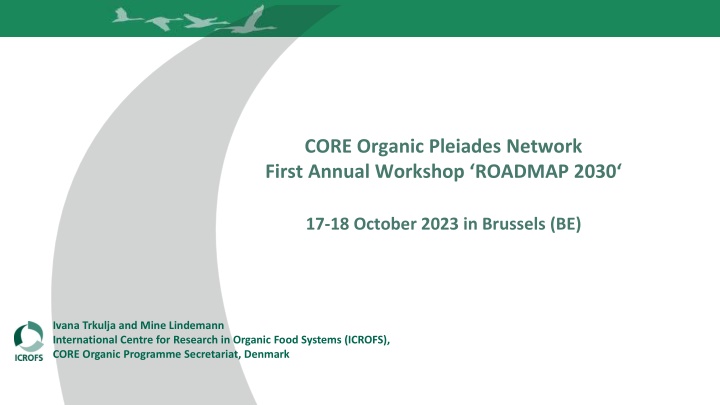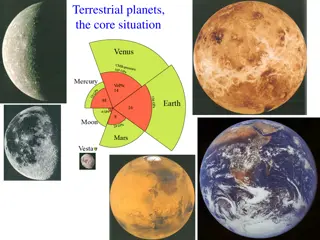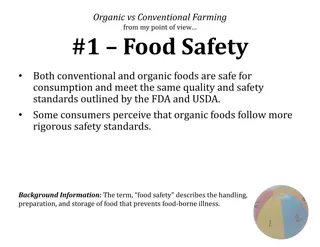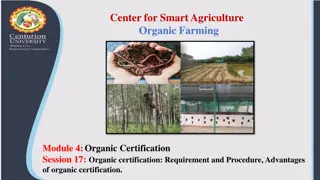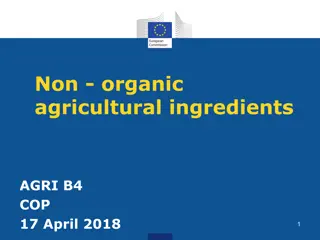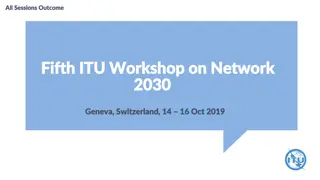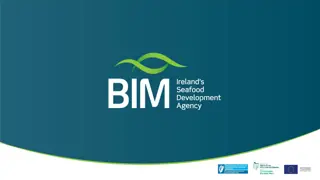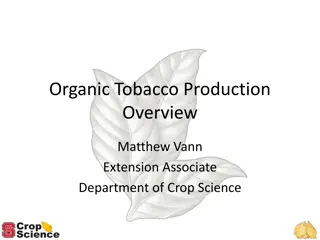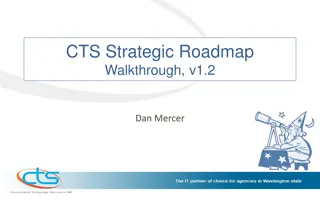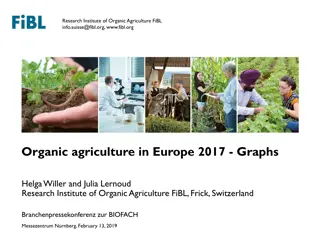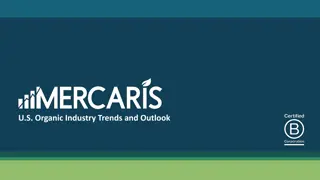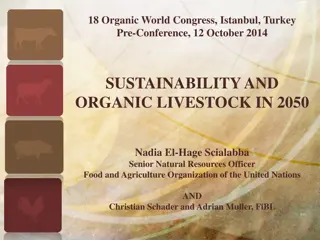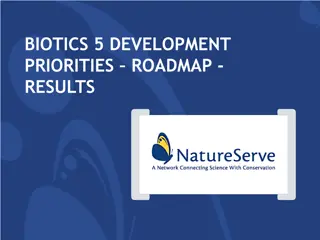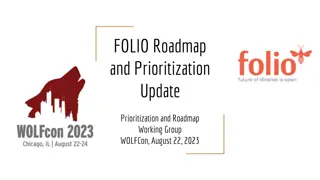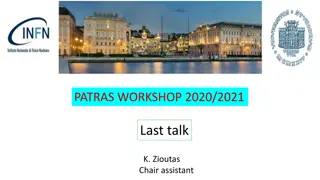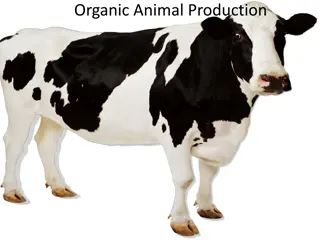CORE Organic Pleiades Network First Annual Workshop Roadmap 2030 - Event Recap
The CORE Organic Pleiades Network held its first annual workshop in Brussels, focusing on organic research and innovation in the European agri-food sector. The event discussed HEU partnerships, national/regional action plans, research funding, and more. CORE Organic aims to enhance knowledge and innovation capacity for organic food systems in Europe, aligning with the European Green Deal and the EU Organic Action Plan. Various sessions and presentations highlighted the network's objectives and activities towards achieving these goals.
Download Presentation

Please find below an Image/Link to download the presentation.
The content on the website is provided AS IS for your information and personal use only. It may not be sold, licensed, or shared on other websites without obtaining consent from the author.If you encounter any issues during the download, it is possible that the publisher has removed the file from their server.
You are allowed to download the files provided on this website for personal or commercial use, subject to the condition that they are used lawfully. All files are the property of their respective owners.
The content on the website is provided AS IS for your information and personal use only. It may not be sold, licensed, or shared on other websites without obtaining consent from the author.
E N D
Presentation Transcript
CORE Organic Pleiades Network First Annual Workshop ROADMAP 2030 17-18 October 2023 in Brussels (BE) Ivana Trkulja and Mine Lindemann International Centre for Research in Organic Food Systems (ICROFS), CORE Organic Programme Secretariat, Denmark
Welcome to the participants Astrid Willener FOAG, CH - CORE Organic Governing Board Chair, Lieve De Cock ILVO, BE-F - on behalf of the Flemish Government hosts, and Ivana Trkulja ICROFS, DK - on behalf of CORE Organic Coordination team. Tour de Table - Interactive Exercise
Presentation content Day One 1. SESSION 1: HEU Partnerships and R&I Investments 2. SESSION 2: National/ Regional Organic Action Plans 3. SESSION 3: Drivers and barriers to change in research funding 4. Concluding Panel Session: Funding mechanisms and organic research in the European Partnerships
SESSION 1 HEU PARTNERSHIPS AND R&I INVESTMENTS How the CORE Organic network can contribute to the European agri-food targets? Facilitator: Astrid Willener FOAG, CH Presentation: CORE Organic Pleiades: Organic Research and Innovation in Horizon Europe Partnerships ROADMAP 2023-2030 (Ivana Trkulja, ICROFS, DK) Presentation: Funding mechanism and organic research in the European Partnership AGROECOLOGY (Nicolas Tinois, SCAR-AW SWG Chair, Juelich, DE)
CORE Organic Programme Objectives The objective of CORE Organic is to improve knowledge basis and innovation capacity necessary for supporting further development of organic food and farming as a way to respond to significant societal challengesinEurope sagricultureandfood systems. The 19 years of activity was supported as: ERA-NET in CORE Organic I and II (2004-2007/ 2010-2013), CORE Organic Plus (2013-2018) and CORE Organic Cofund (2016-2022). The on-going phase is CORE Organic Pleaides Network (2022-2026) as a part of the HEU RIA project OrganicTargets4EU. CORE Organic Pleiades as a continuation of the CO network aims to ensure policy exchange in the relevant areas for organic food and farming research: European Green Deal (2019) specific targets of at least 25% of EU agricultural land to be farmed organically until 2030 and continuous growth of the sector; EU Organic Action Plan (2021) coordination of national organic food R&I programmes via Horizon Europe mission in the area of soil health and food, and partnerships on agroecology and food systems (e.g., HEU projects OrganicTargets4EU, FOODPathS, and Green ERA Hub).
CORE Organic Pleiades Activities The main activities of the CORE Organic Pleiades network from 2022-20226 will be: Network building for stronger coordination of R&I investments in the organic sector thereby widening the CORE Organic network. Alignment of national/regional regulations and structures for more efficient R&I investments in the organic sector hence ensuring more efficient national regulations in our call mechanisms. Preparation of a transnational call supporting organic research to be funded by the CORE Organic Pleiades Network ideally as part of the future European Partnerships.
CORE Organic Pleiades Name We have agreed to use the stellar constellation name Pleiades (known also as Seven sisters) that for centuries was used to indicate a change of the seasons and help farmers in their agricultural work. It is a constellation that is visible to the naked eye. Pleiades were also used in the sea navigation, so both agriculture and aquaculture are included. The name reflects a holistic thinking used in the organics. There are also ancient texts that describe Pleiades in farming. *Hesiod, Greek epic poet, Works and Days , including subject of farming. [383] When the Pleiades, daughters of Atlas, are rising [in early May], begin your harvest, and your ploughing when they are going to set [in November]. Forty nights and days they are hidden and appear again as the year moves round, when first you sharpen your sickle. This is the law of the plains, and of those who live near the sea, and who inhabit rich country, the glens and dingles far from the tossing sea, -- strip to sow and strip to plough and strip to reap, if you wish to get in all Demeter's fruits in due season, and that each kind may grow in its season. https://www.theoi.com/Text/HesiodWorksDays.html
CORE Organic Pleiades Consortium The CORE Organic network started in 2004 and CORE Organic Pleiades is its fifth programme extension from 1 September 2022. The CO Pleiades network consists of 21 European ministries and research councils funding research in organic food and farming on transnational level since 2004 and 12 stakeholder partners representing the organic sector. The network is encompassing 26 European countries/ regions. Since its start in 2004, the network is coordinated by the International Centre for Research in Organic Food Systems (ICROFS, DK). CORE Organic Cofund Final Reserach Seminar, Photo by Thomas Alf ldi, Brussels, May 2022.
CORE Organic Pleiades Network Partners https://projects.au.dk/coreorganicpleiades/about
CORE Organic partners in the HEU Partnerships HEU Partnership/ Initiative Number of partners Number of funders Overlap with the CO network Comments Agroecology 70 20 (30) approximately 17 funders, 5 stakeholders FutureFoodS 87 34 approximately 16 funders, 5 stakeholders Biodiversa+ 81 51 approximately 10 funders Sustainable Blue Economy Partnership 60 40 approximately 5 funders Cooperation in aquaculture area
Agroecology Partnership SRIA AE SRIA Core Theme 1: Redesigning agroecosystems Core Theme 2: Redesigning agroecology value chains Core Theme 3: Agroecology Living labs and Research Infrastructures as instruments enhancing multi-actor involvement for AE transition and the acceleration of creation and adoption of innovations Core Theme 4: Enablers of agroecology transition
Agroecology Partnership SRIA AE SRIA (page 38) In many parts of Europe, organic farmers are pioneers in developing and adopting agroecological practices. Recognising the transformational potential of organic farming, the EC has set in the Farm to Fork strategy the target of achieving 25% organic farmland by 2030. However, in 2020, only 9,1% of the total EU agricultural land was under organic production. This partnership will help to accomplish this objective and will be a win-win both for agroecology and for organic farming. The partnership will build on the achievements of organic farming to drive the AE transition. At the same time, research in agroecology under this partnership will also benefit the organic farming sector and help tackle its challenges. This partnership will integrate R&I activities benefitting the organic farming sector and is committed to support organic farming R&I as an important driver of agroecology.
Future FoodS Partnership SRIA FutureFoodS SRIA
Future FoodS Partnership SRIA FutureFoodS SRIA The organic' case may well serve in this P-SFS as an exemplary case since organic consumption patterns may be close to sustainable diets according to the FAO (Strassner et al., 2015) (page 16) Assessment of existing FS status elements for sustainable diets on European, national and sub- national levels including experiences from established alternative food systems such as organic: analyse the available current food consumption data using harmonised individual dietary intake methods for comparison of diets for different population groups, by age, gender, income and regions as baseline to identify dietary shift and nutrition indicators changes using the FS lens (page 20) To what extent may established alternative diets and food systems including Organic food serve as inspiration and guide towards support and uptake of sustainable healthy diets? (page 20)
Future FoodS Partnership SRIA FutureFoodS SRIA To which extent are niche consumption strategies (vegan, vegetarian, flexitarian, organic, prosumer) efficient ways to help achieving sustainable diets at local and global levels? (page 21) Often, a technological innovation should go hand-in-hand with organisational and social innovations to reach sustainable outcomes; the organic sector may serve as example. Secondly, there is a need to reconsider food processing and supply methods for (re- )valorising forgotten, under-utilized (like pulses) or organic crops or livestock species, saline- tolerant and drought-resistant species (new) aquatic resources, alternative protein sources, (cocktails of) micro-organisms (exploring the microbiomes), cell-culture based food, hydroponic production, etc. (page 25)
The Green ERA hub calls The 1st Green ERA Hub call is open for the submission of proposals that will make Contributions to a sustainable and resilient agri-food system . The scope covers both organic and conventional farming and/or food approaches. The CORE Organic network is a part of the Green ERA Hub (GEH) initiative that gathers 15 international networks from agri-food and biotechnology area. The 1st GEH call encompasses the funding network of 19 funding agencies from 16 countries/ regions: Belgium, Burkina Faso, Cameroon, Denmark, Finland, Germany, Italy, Ireland, Latvia, Lithuania, Luxemburg, Norway, Spain, South Africa, the United Kingdom, and Uruguay, committing 10,630M EUR for research projects. Call topics (proposals must address one of the following four topics): Topic 1: Enhance fertilizer efficiency and reduce fertilizer use Topic 2: Increase European protein self-sufficiency Topic 3: Mitigate GHG emissions in agricultural and food system Topic 4: Sustainable energy use and production in agri-food systems Deadlines The deadline for full proposal submission was September 7, 2023. Call documents are available here.
SESSION 2 NATIONAL/ REGIONAL ORGANIC ACTION PLANS 2023-2030 Organic research and reaching the Green Deal targets of 25% organic land by 2030? Research priorities targeted by CORE Organic funders. Facilitator: Ivana Trkulja ICROFS, DK Presentation: Comparative overview of national/ regional Organic Action Plans 2023-2030 (Nicolas Lampkin (Th nen Institute, DE)
SESSION 2 Workshop Part I: Workshop on identifying and mapping the research priorities from the national/ regional Organic Action Plans covering both farming and aquaculture in partner countries. Part II: Workshop on clustering research priorities relevant for CORE Organic Pleaides identifying overlaps, research gaps and short/long term temporalities. Action point: Key research priorities targeted by the CO Pleiades funders. Co-Facilitators: St phane Bellon (INRAE, FR), and Mine Lindemann (ICROFS, DK)
SESSION 3 DRIVERS AND BARRIERS TO CHANGE IN RESEARCH FUNDING How to bridge the gaps through R&I investments and ensure alignment of transnational cooperation? Bazaar session and Workshop. Facilitator: Ambra De Simone (IFOAM Organics Europe) Co-facilitators: Ivana Cavoski (CIHEAM Bari, IT), Mine Lindemann, Ivana Trkulja.
SESSION 3 Bazaar Welcome to new CORE Organic partners presenting the key research areas and different institutional frameworks supporting organic research and innovation. Samuele Pii (ERIAFF) Aidan Holohan (DAFM, IE) Miodrag Matavulj (CERD, BA) Marie Cuignet/Marc Lateur (SPW, BE Wallonia) Monika Toleikien (LAMMC, LT)
SESSION 3 Workshop Presentation: Legal and procedural barriers to transnationally coordinated R&I investments - recommendations for alignment and harmonisation. Part III: Workshop: Towards the Green Deal organic targets: Research gaps and institutional implications - identifying legal and procedural barriers to organic R&I and mitigation measures. 1. If national organic action plans are to be achieved towards the Green Deal targets what are the implications in terms of required institutional aspects and closing of the research gaps? 2. What are the prerequisites for transnational cooperation and the joint calls? 2025 25% Action point: Key barriers related to R&I investments and transnational cooperation identified by the CO Pleiades funders from SESSION 3.
ROADMAP 2030 - Action Plan 2024-2025 Action Point: CORE Organic ROADMAP 2030 and Action Plan 2023-2025 priorities Plenary drawing exercise, discussion and conclusions on the key findings to be included from Workshops using the interstellar trackers tools Facilitators: Astrid Willener, Ivana Trkulja and Ambra De Simone
ROADMAP 2030 - Action Plan 2024-2025 HORIZONTAL AREAS ACTIVITY AREAS Contribution to the realisation of the new European Research Area through participation in relevant Horizon Europe (HEU) actions on organic food and farming Communication and Dissemination Science and Society (RRI-Responsible Research and Innovation) Contribution to the Green Deal strategic targets, more specifically Farm to Fork (F2F), Biodiversity strategy and Organic Action Plan (OAP) Social Sciences and Humanities (SSH) Launching of CORE Organic Pleiades Network 2022- 2027 and sustaining transnational network cooperation Widening participation in the CO Pleiades network
SESSION 4 Concluding Panel Session (fishbowl format): Funding mechanism and organic research in the European Partnerships Facilitator: Bram Moeskops (FiBL Europe) Susana Gaona Saez (EC, DG Agri) Henri Delanghe (EC, DG Agri, Organic Unit) Annet Zweep (MinLNV, NL) Korinna Varga ( MKI, HU) Discussant: Nicolas Lampkin (Th nen Institute, DE)
Presentation content Day Two 1. SESSION 1: Inspirational speaker Partnership with a private sector 2. SESSION 2: CORE Organic ROADMAP 2030 and Action Plan 2023-2025 priorities 3. SESSION 3: CORE Organic Pleiades Implementation Status 2023
Welcome to the participants Astrid Willener FOAG, CH - CORE Organic Governing Board Chair Thematic Tour de Table - Interactive Exercise
SESSION 2 ROADMAP 2030 - Action Plan 2024-2025 Action Point: CORE Organic ROADMAP 2030 and Action Plan 2023-2025 priorities Plenary quality assurance, final discussion, and adoption of drafts presented in the interstellar tracker. trackers tools Facilitators: Astrid Willener, Discussant: Bram Moeskops
ROADMAP 2030 - Action Plan 2024-2025 HORIZONTAL AREAS ACTIVITY AREAS Contribution to the realisation of the new European Research Area through participation in relevant Horizon Europe (HEU) actions on organic food and farming Communication and Dissemination Science and Society (RRI-Responsible Research and Innovation) Contribution to the Green Deal strategic targets, more specifically Farm to Fork (F2F), Biodiversity strategy and Organic Action Plan (OAP) Social Sciences and Humanities (SSH) Launching of CORE Organic Pleiades Network 2022- 2027 and sustaining transnational network cooperation Widening participation in the CO Pleiades network
SESSION 3 CORE Organic Pleiades IMPLEMENTATION STATUS 2023 Membership Status Programme Implementation and Visibility Programme Budget 2022/2023 CO Annual Workshop 2024 and Next Steps AOB
CORE Organic Pleiades Membership Status https://projects.au.dk/coreorganicpleiades/about
CORE Organic Pleiades Governing Board Chair The main governance structures of the network are the Management Board and the Governing Board. The Governing Board members are all network partners that have full membership. The network meets informally approximately every three months (on-line) and there is one physical meeting per year. The Management Board (MB) consists of partners listed below that are included in the OrganicTargets4EU project. The MB meets virtually on bi-monthly bases: 1. 2. 3. 4. 5. AU-ICROFS, DK (Coordinator) Ivana Trkulja and Mine Lindemann, IFOAM EU/ TP Organics (Stakeholders) Ambra de Simone / Maria Gernert, INRAE, FR (Funder) St phane Bellon, CIHEAM Bari, IT (Stakeholder) Ivana Cavoski, FOAG, CH (Funder) Astrid Willener. On 18 October 2023, we plan our first physical Governing Board (GB) meeting. Astrid Willener s (FOAG, CH) candidature for the Chair of GB was supported by the MB and the GB.
GB Decision points Membership Status Programme Implementation and Visibility Programme Budget 2022/2023 CO Annual Workshop 2024
Next Steps Follow the developments in the HEU Partnerships via SCAR (HEU WP Cluster 6) Join the National Mirror Groups on HEU Partnerships if available in your national/ regional contexts Events related to the 20th Anniversary of CORE Organic Network throughout 2024 Plan your participation at the TP Organics Organic Innovation Days in Autumn 2024 Remain in contact with the CORE Organic Programme Secretariat
Thank you for your kind cooperation! COREOrganicProgrammeSecretariat ivana.trkulja@icrofs.org;mine.lindemann@icrofs.org CORE Organic Pleiades Homepage https://projects.au.dk/coreorganicpleiades
